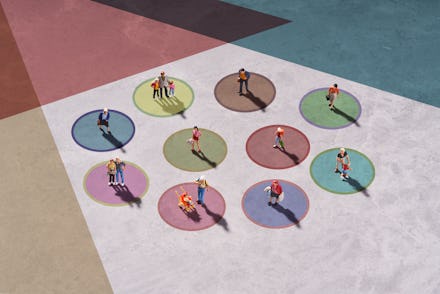How social distancing is affecting your immune system

Lately, I’ve gotten a bit paranoid that social distancing could affect more than my social calendar. A part of what strengthens our immune systems is hanging out with other people — our bodies fight off the germs we come into contact with this way. And although staying apart is necessary to curb the pandemic, couldn’t social distancing be affecting my immune system in a negative way?
“By the time you are an adult, you have spent years being exposed to many types of bacteria and viruses. Your immune system has several tactics for fighting invaders,” explains Mehmet Oz — a.k.a Dr. Oz, host of The Dr. Oz Show, who is also an NYC-based cardiologist and professor of surgery at Columbia University. Children need to be exposed to germs so that their immune systems, which are still growing, can build up tolerance and immunity, but as adults, our bodies have already done this work.
Put that good news in your pocket for a minute though; there’s more. Your immune system is divided into two parts, the innate and adaptive systems, Oz explains. The innate immune system is the body’s first-line defense against germs, he says.. They include the skin and mucous membranes — such as those found in the mouth and nose — as well as a certain type of immune cells, like white blood cells.
Although the innate immune system evolves throughout childhood, then, your body is born with the ability to fight off infectious invasions. Coughing and sneezing are examples of the innate immune system at work — your body literally ejects anything that seems dangerous. You are born into a body that knows how to fight.
The other part of the immune system is called the adaptive immune system. The adaptive immune system works to destroy a specific germ that is causing an infection, explains Oz. This is the part of the immune system that learns through exposure and it is what allows us to become resistant to illnesses like colds and COVID-19 once our bodies have effectively fought them. “[The adaptive immune system] can remember a germ to protect the body in future attacks. Vaccines are developed to work with the adaptive immune system by helping the body recognize specific invaders,” Oz tells me.
But while fighting off an infection does strengthen your body’s ability to stave off that specific infection in the future, that doesn’t mean that being exposed to more germs is better. “Research shows that your immune system works best in fighting bacteria and viruses when your body is in a healthy state,” Oz says. Fighting off invaders is work for the body, then and it works best when it’s not tired out by being constantly in battle, but it doesn’t really get out of practice.
Oz suggests taking a measured approach towards maintaining our immune systems. “I would not run towards infections, but being a germaphobe is counterproductive and wastes time as well,” he says. During a pandemic, that means washing your hands frequently, wearing a mask, and staying six feet away from people when outside your home.
But distancing yourself from other humans can affect your immune systems in other, more subtle, ways. “Stress weakens the immune system and isolation can cause stress and depression,” Oz says. And social isolation is definitely a form of stress. “There is evidence linking social isolation to poor sleep quality, impaired executive function — the ability to make decisions and stay focused — and poor cardiovascular function,” Oz says. One recent study he cited even found that social isolation increased the risk of premature death. In other words, we tend to think of isolation as causing “emotional” health issues, but it also has an impact on our physical health. There’s just no easy way to separate the mind from the body when it comes to health.
But that doesn’t should throw COVID-caution to the wind and start gathering in groups to lower our stress levels. That mentality is why we are seeing such devastating surges in infection rates right now. Oz says that the best way to show someone love is to social distance to protect them from getting sick.
Physical distance does not have to mean disconnection, and it should not. “It’s important to find other ways to stay social,” Oz says. This doctor’s orders are: Schedule regular video check-ins with friends, go to restaurants with outdoor seating, and plan outdoor walks with your people.
There are also solo ways we can protect our immune systems from some of the impact of social distancing. “Focus on the things in your life that you can control,” Oz says. “Now more than ever, it is so important to meditate, relax, do yoga, go for a walk, take deep breaths and practice gratitude.” If yoga and gratitude feel too woo for you, at least try to replace doomscrolling with phone banking and substitute that depression nap with some deep breathing. Be as vigilant about protecting your emotional health as you are your physical health. As Oz says, “when you reduce stress, you empower your immune system.” And that gives you greater resilience to keep fighting the good fights, both viral and socio-political.